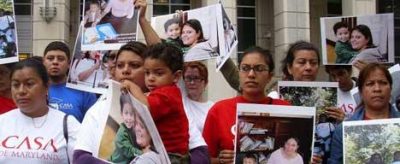One need only consider the story of Roxana Santos mentioned in Break the Chain’s previous blog post to understand the very real implications of strict immigration enforcement laws in this country and what that looks like for a woman. Roxana lives in Maryland. She is the mother of a one-year old little boy and she was scheduled to be deported to her native El Salvador at the end of last month. Her crime? Eating her lunch outside her place of employment. On Thursday, September 29th, one day before the scheduled deportation, Ms. Santos was granted a one year stay while allegations of discrimination and overzealous enforcement of immigration laws are investigated.

Roxana Santos and other immigrant women demand justice.
The debate around immigration reform in our nation right now is centered around nativist fears, ideological differences about what an American should look like, and the idea that immigrants are “taking” jobs from U.S. citizens who have been hit hard by the recent economic recession. Immigrants are not taking our jobs but the fear and hate speak permeates everyday discussions. There is, however, little talk about the relationship between gender, immigration and exploitation. Immigration is no longer a male dominated phenomenom- women comprise 49% of the world’s 214 million international migrants. This trend has been called the “feminization of migration.” According to statistics compiled by Reuters for International Woman’s Day 2011, of the 1.2 billion people living in poverty worldwide, 70% are women. If opportunities do not exist for women at home, they will leave. This is a basic survival instinct that has kept our species alive since the beginning of humankind.
Although access to paid work can definitely have very positive effects on a woman’s ability to provide for her own (and her family’s) physical and psychological needs, migration in search of such employment can also have equally devastating consequences. It is no secret that undocumented workers are particularly prone to being exploited.
Women are subjected to being targeted in transit and when they arrive in the host country. According to the film The Invisibles, highlighted by this year’s Letelier-Moffit Human Rights Awards international honoree Padre Pedro Pantoja, six out of ten migrant women are sexually assaulted during their journey north through Mexico.
A lack of a support system can make a woman more vulnerable to gender-based violence and intimidation upon arrival as well. There is a triple threat of exploitation (based on gender, race, and legal status) that today’s state based deportation-focused laws are not addressing. Being unable to access extended family through family reunification programs also prevents some women from accessing the public work sphere. In this scenario a mother’s only option may be domestic work.
A gendered analysis may determine that it would be beneficial for society if the legal definition of family was widened to include parents of adult children. If a woman’s parents had a legal remedy to migrate to be with her this could mean the difference between her being able to work to support her family or not. This is particularly true for cultures that highly value extended family kinship and/or have no other childcare options available. Immigrants do not want to be a burden to existing social welfare mechanisms; they simply need legal mechanisms that respect their right to migrate, work, and live the life they want to live.
We have a habit of seeing things as gender neutral. This means that we are taught to “be objective” and analyze information from this neutral perspective. The only problem is the “neutral” most typically refers to the White, property owning, male’s perspective. Immigration policy and reform is a great example of an area where a gender lens needs to be applied. According to the International Organization for Migration “women and men migrate for different reasons, use different channels, and have different experiences.” Women will continue to migrate to ensure their livelihood and the livelihood of their families, and they face different challenges and need laws that adequately respond to these challenges. Comprehensive, gender sensitive reform is needed to halt the trend of states targeting women and families for deportation. We cannot “add and stir” gender into immigration reform legislation post enactment; now is the time to discuss and elevate these concerns.
Celia Garcia Perez is an advocacy intern for the Break the Chain Campaign.
